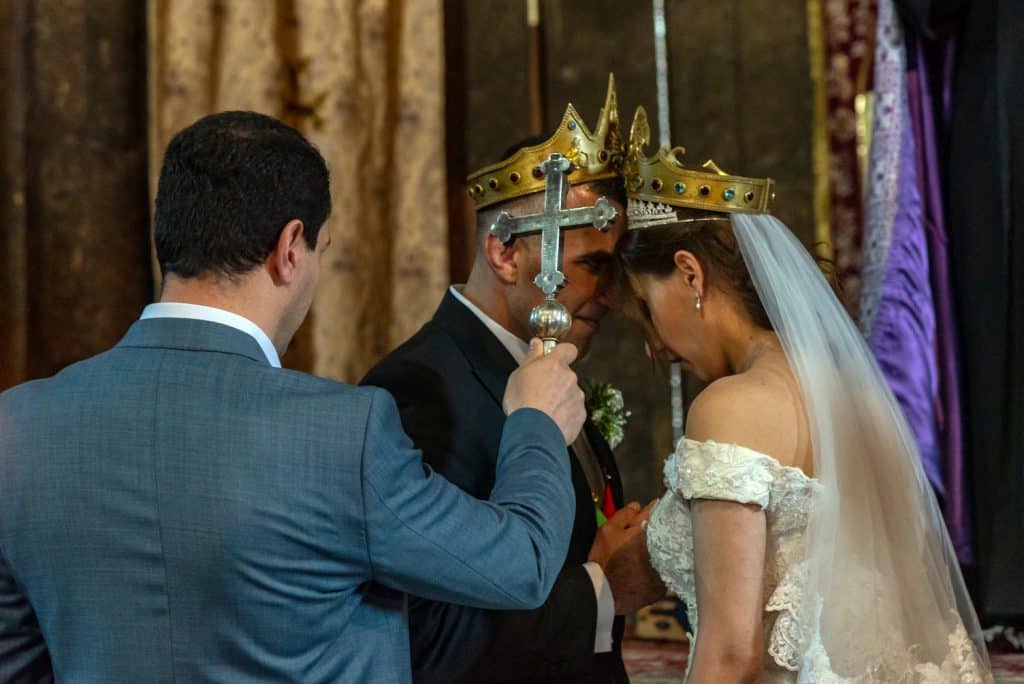If you are a Canadian citizen or permanent resident, once you have married your Armenian fiance or you have lived together for one year as common-law partners, you can sponsor him or her for permanent residence in Canada.
Marriage Customs In Armenia | Sponsorship Challenges From Armenia | Sponsorship Application Requirements from Armenia
Requirements To Get Married in Armenia
For Armenian residents / citizens
- Joint written application of the persons entering into a marriage (sample form may be obtained from the website of the Ministry of Justice of the Republic of Armenia at www.moj.am or from the State Registrar).
- The surname of the spouses is filled in the register of an act of marriage at their will (a joint surname or keeping a premarital surname).
- Identification documents of the persons entering into a marriage.
- Document on termination of the previous marriage, if any of the persons had been previously married (for example, divorce certificate, death certificate of a spouse or court’s civil judgment on declaring the marriage as invalid having entered into legal force, civil judgment on divorce made by a court in a foreign state having entered into legal force, etc.).
For Foreign nationals
- Joint application of the persons entering into a marriage;
- Reference on not being married, issued by foreign competent authorities, with an apostille attestation stipulated pursuant to the 1961 Hague Convention Abolishing the Requirement of Legalisation for Foreign Public Documents and with a notary attested translation into Armenian (if the state is not a party to the Convention, then the documents are subject to consular certification, and in case of separate countries prescribed by international treaties of the Republic of Armenia no attestation is required).
- Document attesting termination of the previous marriage, if the person has been previously married-with an apostille attestation of validity of signatures (if the state is not a party to the 1961 Hague Convention Abolishing the Requirement of Legalisation for Foreign Public Documents, then the documents are subject to consular certification), with a notary attested translation into Armenian (for example, death certificate, civil judgment on divorce, divorce certificate (reference), etc.);
- Copy of passport, translated and attested from a recognized notary office.
On submission of these documents, the State Registrar issues a Marriage License to the couple, which is valid for 10 days from the time it has been issued. If the couple intend to change the date of marriage, they can do so within this time, and request a date no later than 3 months from the license issue date.
Once the marriage takes place, the State Registrar will formally issue a Marriage Certificate to the couple, legally recognizing their marriage.
Marriage certificate
Only the marriage registered in the Body of The Civil Status Acts Registration is recognised in the Republic of Armenia. The actual cohabitation, marriage in church order are not legally recognized under the legislation of the Republic of Armenia, except as mentioned above.
The property acquired by spouses in the course of marriage is their joint ownership, unless otherwise prescribed by law or by a contract concluded between them.
Costs To Get Married in Armenia
A state duty in the amount of AMD 1,000 is charged for registration of a marriage with participation of a foreigner.
In case of a wish to register the marriage of the foreign citizens, stateless persons in the Republic of Armenia, the citizens of the Republic of Armenia permanently residing in a foreign state with each other or with the citizens of the Republic of Armenia prior to the prescribed 10-day period, the additional extra-budgetary sum prescribed by the Decision of the Government at the following rates is paid, in addition to the state duty:
- for registration within two working days – AMD 150,000;
- for registration within five working days – AMD 120,000;
- for registration within seven working days – AMD 50,000.
Steps To Get Married In Armenia
Armenia has a secular government, thus the act of the marriage requires State Registration. There are no requirements to register the marriage in the Church or in other religious institutions. Joint application of both parties is required for state registration of the marriage.
Process
State Marriages in Armenia are administered by the Body of The Civil Status Acts Registration (State Registrar).
Where one spouse is a foreign national/citizen then the Ministry of Justice of the Republic of Armenia accepts applications and gives permission to the couple to register their marriage.
Proxy marriages are not recognized, however, in case one of the parties cannot appear to the Civil Registry, separate declarations must be provided and approved with signatures as required by law.
The following guidelines are applicable to all marriages in Armenia.
- Mutual consent of the man and the woman and achievement of age of consent by them is obligatory.
- It is forbidden to get married:
- With any person who is already married, as recognized by law
- Between relatives, such as parents and children; grandfather, grandmother and grandsons; with or between step brothers and step sisters; cousins and sisters.
- Between adoptive parents and the adopted child.
- Where one of the spouses is recognized by court as incapacitated.
- Registration of a marriage through a letter of attorney or a representative, i.e. durante absentia, is prohibited.
There are restrictions to hold marriages outside of the office of the State Registrar. However, the following are exceptions:;lcertify the existence of a condition that requires such marriage to take place outside the office of the State Registrar. This application and evidence must be presented at the state registry at least 5 days prior to the date of marriage.
- Either one of the parties is detained or serving a punishment in a place of imprisonment. In this case, the person in detention or serving a punishment in the place of imprisonment also attaches the consent to carry out the State Registration of the marriage at the relevant place, given by the head of the detention facilities or that of the place of imprisonment, to the statement on marriage.
- Where persons wish to marry personally or through an authorized person in the manner prescribed by the State Registrar, they must submit an application to the State Registrar for solemnly carrying the state registration of the marriage at the relevant place. In this case, the cost of transporting the employee of the State Registrar to and from the place of marriage will be the responsibility of the parties entering into the marriage.
Marriage Customs in Armenia
The traditional Armenian wedding has many traditional activities and events. Some of them have cultural significance, some important to the couple and their family, and some just for fun.
Proposal
Although this tradition has lost its popularity in recent years, it is still important. The groom talks to the bride to ask for her hand in companionship. When she obliges, the groom then goes to the bride’s family to seek their approval. It is rare for the family to decline once the woman has made up her mind.
This ceremony is referred to as Khosk-Arnel which loosely translates to asking for permission. It is only limited to the two families. The small ceremony involves an invitation from the bride’s parents to the groom’s parents. They come with flowers and chocolates. The two sides will engage in a talk to introduce their lineage and genealogy to make sure that the bride and groom are not related.
Armenian Marriage Registration
At this stage the marriage registration takes place, following which a marriage license is issued to allow the couple to get married and legally recognize their union. Traditional festivities continue after seeking the license.
Red and Green Ribbon Ceremony
This is an old Armenian wedding ceremony that has been passed down generations across decades. It is very common in Armenia, Iran, and Isfahan. It involves the placing of red and green ribbons on the heads of the bride and groom. Red signifies sacrifice while green symbolizes fertility, peace, and abundance of life.
When the bride has finished dressing her wedding gown, a close male member of her family is invited to help her wear shoes. This is usually a brother, uncle or close family friend. Similarly to the door closing ceremony, the man can hold onto one shoe to demand some form of payment from the groom or his family.
It is traditional for all single female relatives of the bride to write their names under the soles of her shoes. This is a sign of wishing her good luck. When each female gets married in the future, the bride crosses the names out.
Closing the Door Ceremony
Just when the bride is ready to leave for the wedding venue, the door is closed to prevent her from leaving. This is usually done by an elder brother or such a close male member of the bride’s family. He acts as a “bouncer’ and is sometimes accompanied by other male relatives. They block the door to demand some kind of payment for the ‘hard work that they have done’ to raise the girl over the years. Oftentimes, the bouncer holds a sword and mockingly threatens to prevent the wedding from happening.
It is dependent on the family of the groom to decide who pays up. Payments are usually in the form of money, but traditional gifts such as foodstuffs and clothes are given. It is customary for the initial offer to be a small amount of money. The bouncer examines it to determine whether or not it is enough to warrant him opening the door.
If he is not amused, he demands more payment. All the while, he demonstrates visibly as other members of the bridal party take pictures and videos. In extreme cases, large sums of money are offered to appease the ‘angry and hungry’ family. In most traditional ceremonies, the father of the bride will step in to cut the deal.
Religious Wedding Ceremony
Just like all weddings, there is the best man at an Armenian wedding. The local name is kavor or kokahayr which means godfather in English. He should be older than the groom, such as an elder uncle or even brother. He escorts the groom throughout the ceremonies. The bride can choose a maid of honor from her friends or close family members.
The wedding party splits into two groups – the bride’s side and the groom’s side. A bride’s party is composed of her immediate family, maids, a maid of honor, and close family members. On the other hand, the groom’s side is composed of his best man, groom’s men and parents. Each family gathers at their own homes to dress and get ready for the function.
At around 10.00 am, the groom’s family heads to the bride’s parent’s house. They request for the gate to be opened, upon which they join the bride’s family in song and dance. Traditional foods and drinks are served as they dance around. Shortly afterward, they proceed to the church as guests cheer.
A presiding minister blesses the rings and asks the bride and groom to make their vows. In traditional Armenian history, the bride takes the name of the groom. This is a fairly short affair that is followed by a photo session. When it is over, the party proceeds to a reception at the home of the groom.
Armenian Wedding Reception
It is a strict tradition for the groom’s family to entertain the guests, no matter how large the wedding party is. This is a sign that the man is wealthy enough to cater to the woman. It starts just after noon where a light traditional cocktail is served. The bride and groom must drink from the same glass to symbolize their newly found union.
The main course is served by butlers who walk around in large platefuls. It is believed that food has to be plentiful so that every guest can leave their blessings at the house. It features a rich serving of meat, chicken, and fish. These are accompanied by traditional Armenian potatoes, beans and an array of vegetables.
Most Armenian weddings are lavish, with the groom flashing gifts such as jewelry to the bride. Guests also shower the couple with gifts and cash. All the while, loud Armenia music plays as guests dance and drink to their fill. The wedding reception can continue up until the wee hours of the following morning.
State body performing the marriage
The state registration of a marriage is carried out by:
- the territorial body of the State Registrar, at the place where the marriage has been requested by one of the parties to the marriage;
- the Chamber of Solemn Registration of Marriage and Birth within the system of the Ministry of Justice of the Republic of Armenia.
The registration of a marriage of the citizens residing without a permanent registration is carried out by the State Registrar at the temporary residence of a citizen entering into a marriage. In that case, the citizen needs to submit a reference from the place of temporary residence issued by competent authorities.
If the application for marriage is filed by a military serviceman wishing to marry, as per the place of service, then the allocation of the relevant military unit or the institution is considered as the place of residence of the military serviceman. Military servicemen submit a reference from the place of military service.

Sponsoring Your Spouse from Armenia to Canada
Possible Challenges for Sponsorship from Armenia
Time Limits
State registration of a marriage is carried out after 10 days following the day of filing a joint application to the territorial body of the civil status acts registration. A later period for state registration of a marriage may be specified in the joint application of the persons entering into marriage, but not later than three months following the day of filing an application.
If those wishing to marry are not able to appear to the body of the civil status acts registration for valid reasons on the day they have decided, then the period of registration of the marriage is changed upon their request. A note about that is made on the application for marriage.
Where the applicants fail to appear to the body of the civil status acts registration within a period of three months following the day of filing the application for marriage, the application is deemed as invalid.
Based on the joint application of the persons entering into marriage, the 10-day period of the state registration of a marriage may be shortened in case of the following valid reasons:
- existence of a child (children) in common of the persons entering into a marriage;
- pregnancy of a woman entering into a marriage (of 12 weeks at least);
- conscription of a person to a fixed-term military service entering into a marriage;
- a person entering into a marriage being at a fixed-term military service, or serving in the Armed Forces of the Republic of Armenia;
- in case of a long-lasting departure (absence) of those entering into a marriage or one of them from the territory of the Republic of Armenia;
- a serious disease of a person entering into a marriage.
The valid reasons must be attested by relevant documents (for example, a medical reference regarding the pregnancy of a woman, a birth certificate of a child and certificate of establishment of paternity, a reference from the place of military service, a document attesting the departure from the territory of the Republic of Armenia, etc.)
Frequent sponsorship interviews
Due to a high incidence of marriage fraud in applications for sponsorship from Armenia, interviews are frequently convoked for the applicant to prove that their relationship with their sponsor is genuine.
Questions frequently asked at the interview include:
- How did you first meet your sponsor? Explain the setting.
- Did you and your sponsor know each other, or was the first meeting arranged by family?
- Was there a middle man/person involved, and was he/she related or known to both families?
- Did you talk with each other privately before agreeing to the marriage?
- Who was present at the first meeting? What was decided at the meeting?
- Was there an engagement ceremony? Where was this held, who was present?
- Who was involved in arranging the marriage?
- Were you married earlier? If yes, did you seek a divorce decree? When did you get divorced?
- How many people attended your marriage? (use photographs as evidence)
- When did your sponsor immigrate to Canada?
- What does your sponsor do for a living?
- What is your sponsor’s phone number?
- Do you have any relation with your sponsor other than marriage? (visa officer is attempting to ascertain whether there was a relationship and therefore a motive to sponsor the applicant other than a genuine marital relationship)
- Who accompanied your sponsor when he/she came to Armenia to get married?
- Who proposed? When was the proposal made? When did you get married?
- When did you and your sponsor live together?
- Did you and the sponsor attend any weddings or functions together?
- What is the name of your spouse’s company?
- What kind of work does the sponsor aspire to do in the future? Any career plans?
- What was his/her previous job before present employment? Why did the sponsor change jobs? How long at current employment?
- What does the sponsor like about the job? What is his/her boss/supervisor’s name? What are the names of the people he/she works with? What is the nature of the job? How much does he/she make?
- What does the sponsor like/dislike about [INSERT CANADIAN CITY]?
- Where do you and your sponsor plan to live in Canada?
- What do you plan to do once you get to Canada (go to school, learn English, get a job)
- What are your spouse’s friends’ names?
- What does your sponsor do in his spare time? What does your sponsor do when he’s not working?
- What is your spouse’s favourite sport?
- Did you go on a honeymoon or outing after your marriage?
- Where did you go to/How long did you go for?
- How long did your sponsor stay in Armenia after the marriage?
- Do you have a joint bank account with your spouse?
- How much money does your spouse send to you for your maintenance?
- What was the mahr (bride price) paid by your husband? Was it in the form of property, cash, or any other form of asset transfer?
- How often, and how do you stay in contact with your spouse? (review emails, chat conversations, or any other evidence that strongly suggests constant communication)
The intention of the visa officer would be to determine eligibility for spousal sponsorship of the sponsor and the sponsored person, and that the marriage is genuine (legally recognized) with all the evidence that would support the genuineness of the marriage.
The applicant should not try to memorize things to tell the visa officer, but should instead be comfortable talking about the details of the relationship which may include very personal details.
Sponsorship Application Requirements from Armenia
Country Specific Documents Required for Armenia:
Forms:
Supplementary Information – Your travels [IMM 5562] (PDF, 1.76 MB)
The principal applicant and all family members included in the application who are 18 years of age or older must complete this form.
Details of Military Service [IMM 5546] (PDF, 1.16 MB)
This form needs to be completed for anyone included on the application who has ever held a high ranking/senior official government position or served in the military, army, defence or police unit, (including National Service), and submit a copy of the military card/booklet, including blank pages, if applicable.
Documents:
For divorces obtained in Armenia, submit an original “Decree Absolute”.
The principal applicant and all family members included in the application who are 18 or older must provide a copy of all pages of their labour book/workbook if they hold a passport for this country.
Are documents issued in Armenia issued in any language other than English or French? If so, what language(s)?
The official language for business and documentation in Armenia is Armenian. Any document not issued in French or English must have a translation which meets IRCC requirements.
Is a visa required for a person from Armenia to enter Canada if they wanted to do In-Canada sponsorship?
A person from Armenia who wishes to enter Canada in order to visit a fiance or spouse while applying for a spousal sponsorship must obtain a Temporary Resident Visa before being allowed into Canada.



